I read the article about retired Supreme Court of Canada justice Rosalie Silberman Abella with interest (“Rosie Abella said she’d answer questions when she turned 75,” Supreme Court, July 2021). There is much to like about her as a Canadian, as a woman, and especially as a human being. However, it is clear that Madam Abella needed much more time in the cut and thrust of the court system as a working lawyer before her appointment as a judge at just 29 years of age. Her understanding of the fact that parliamentary supremacy in Canada is a constitutional principle is underdeveloped, to say the least. The courts are the mechanism that upholds the rule of law established by Parliament, and not, as she stated, “the people in the democratic universe who have the right to make those decisions that a legislator may not be comfortable making.” What is most disconcerning are her final thoughts about past Supreme Court decisions that likely stretched the intent of the Canadian Charter of Rights and Freedoms beyond what its framers envisioned. “We have time on our side,” she told journalist Paul Wells. “And history. Time will tell us whether it turned out to be the right decision or not for the public. And if it wasn’t, another court will change it. Or the government will change it.” Little solace for those whose livelihoods were jettisoned by delusory activism rather than clear headed common law.
John Challinor II, Milton Ontario
PDF of Mr. Challinor II’s “Judging a judge” letter in Maclean’s August 2021 issue
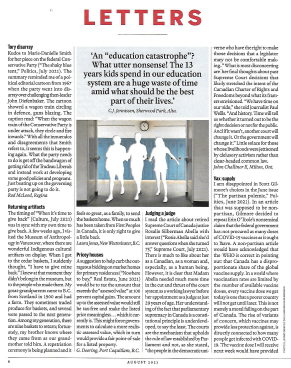

Refer also to:
Comment by a rural Albertan:
“Pretty frightening stuff by somebody who knew about gas chambers and how easy it was to make a mistake i.e. the Jews and Royals that backed Hitler up yet she is beyond all that, only there for the accolades and applause because SHE is never wrong. Just Evil! Kenney level evil and they just keep coming out of the woodwork.”
How Rosalie Abella’s personal history shaped her legal legacy, The daughter of Holocaust survivors will soon give up her seat on Canada’s Supreme Court. But her quest for global justice, over and above the rule of law, is far from finished June 26, 2021, The Globe and Mail
… “The law is there for the public, to serve the public, and to serve the public’s need for justice.”
![]() But not for me – a frac-harmed Canadian with a “valid” Charter claim against the Alberta Energy Regulator (AER, 100% industry-funded and led) – or my need for justice. Why? Because I publicly, for decades, stated my opposition to Israel murdering Palestinians including children, stealing homes and land, and a $4Billion dollar gas field (that needs to be frac’d), destroying olive groves, violating rights, etc.? In my experience, J Abella’s quote above would be more accurate with “AER” replacing “public”
But not for me – a frac-harmed Canadian with a “valid” Charter claim against the Alberta Energy Regulator (AER, 100% industry-funded and led) – or my need for justice. Why? Because I publicly, for decades, stated my opposition to Israel murdering Palestinians including children, stealing homes and land, and a $4Billion dollar gas field (that needs to be frac’d), destroying olive groves, violating rights, etc.? In my experience, J Abella’s quote above would be more accurate with “AER” replacing “public”![]()
… “We serve the law best when we do so spontaneously, in our own way, with our own voice, and don’t try to force ourselves to comply with some artificial, ideal-type notion of how a judge should be… to humanize the law, reduce its artificiality.”
![]() Like belittling an applicant in a ruling with “Alice in Wonderland” insults? Like making shit up in a ruling to discredit an ordinary citizen whose Jewish family in Europe was also endangered by Hitler’s genocide and who was sacrificing every penny of her life-long savings to pay lawyers, mandatory Ottawa Agent and expensive court costs?
Like belittling an applicant in a ruling with “Alice in Wonderland” insults? Like making shit up in a ruling to discredit an ordinary citizen whose Jewish family in Europe was also endangered by Hitler’s genocide and who was sacrificing every penny of her life-long savings to pay lawyers, mandatory Ottawa Agent and expensive court costs?![]()
… Whether she’d change any of her past rulings:
“Not one.”
Lorne Sossin: Statutory Bars to Constitutional Remedies: The Importance of Being Ernst
… An immunity clause can preclude only those claims that a legislature has the constitutional authority to bar — that includes civil claims for damages, but it cannot bar Charter claims (including Charter claims, as in Ernst, where one of the remedies sought is Charter damages). On this reading, the Supreme Court of Canada could and should have interpreted the statutory bar as inapplicable to this claim to the extent a breach of the Charter is properly pleaded.
Further, to Abella J.’s objection in her concurring reasons, the Alberta Government would not need to have received formal notice of the claim, since the validity of the statutory immunity clause does not arise as a live issue if it is interpreted as inapplicable to Charter claims.
Returning to my broader objection with the majority of the Supreme Court of Canada’s approach to Charter damages, the claim in this case, on its face, is that a Charter breach has occurred. Ernst claims she was silenced as punishment for her opposition to the Board.
The availability of Charter damages, like the availability of other Charter remedies (declarations, injunctions, etc.), cannot be precluded by an act either of a provincial legislature or of Parliament (unless the notwithstanding clause under section 33 is invoked, which is the sole mechanism for immunizing public bodies from Charter scrutiny, and therefore, from Charter remedies). Legislation can limit the availability of Charter remedies from administrative tribunals and regulators as they have no inherent powers, and so can only provide those constitutional remedies which fall within their statutory jurisdiction,54 but here, the remedy sought is from a court.
In my view, the Court in Ernst misconstrues the place of Charter damages in the context of Canada’s constitutional architecture. It is important to recall what is at issue in Ernst. The case is not about whether the Charter was breached, or, if so, whether Charter damages are appropriate — rather, this case is about whether a claimant should have a chance to prove her allegations of a Charter breach warranting damages as a remedy, and whether a statute can bar her from having such an opportunity. By upholding the validity of a statute to bar a Charter remedy, the Supreme Court of Canada has allowed a legislature to unilaterally circumscribe constitutional protections and done so for no broader constitutional rationales or benefits. …
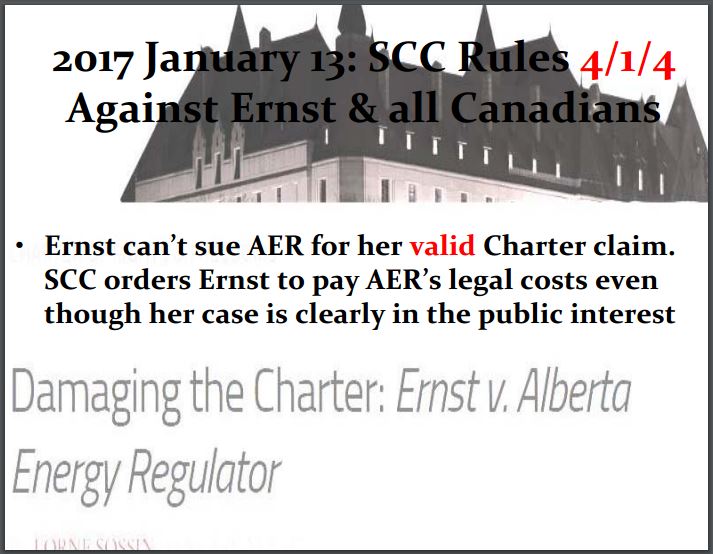
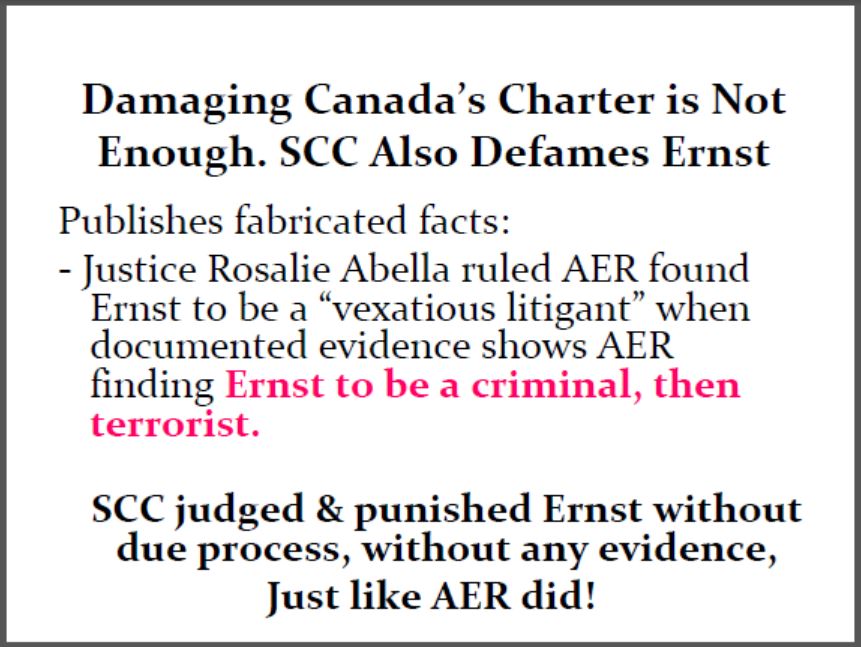
Slides from Ernst presentations, including in North Yorkshire, UK
Below, a bit of background on what led me to the Supreme Court of Canada:
2012: AER’s outside counsel, Glenn Solomon, filed his brief in Court of Queen’s Bench and stated as fact that AER found me to be a terrorist (changing that the regulator judged me a criminal 7 years earlier) with no evidence, no hearing, no trial, no due process, no arrests, no fingerprinting, no charges. Justice Neil C Wittmann later ruled that there was “absolutely” no evidence of me being a terrorist but instead of punishing Solomon for lying, Wittmann punished me.
2005: Letter from AER (then EUB) judging me to be a criminal with no evidence, no hearing, no trial, no due process, no arrests, no fingerprinting, no charges, and giving me no chance to defend myself:
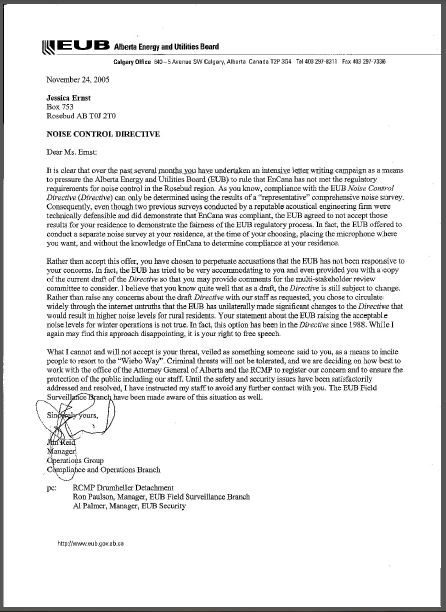
Did AER/EUB write “vexatious litigant” anywhere? I didn’t become a litigant until two years after the above letter was received.
The Supreme Court did not allow any evidence to be filed for the Ernst vs AER hearing, only matters of law were allowed to be argued, which makes Abella’s lie triply nasty.
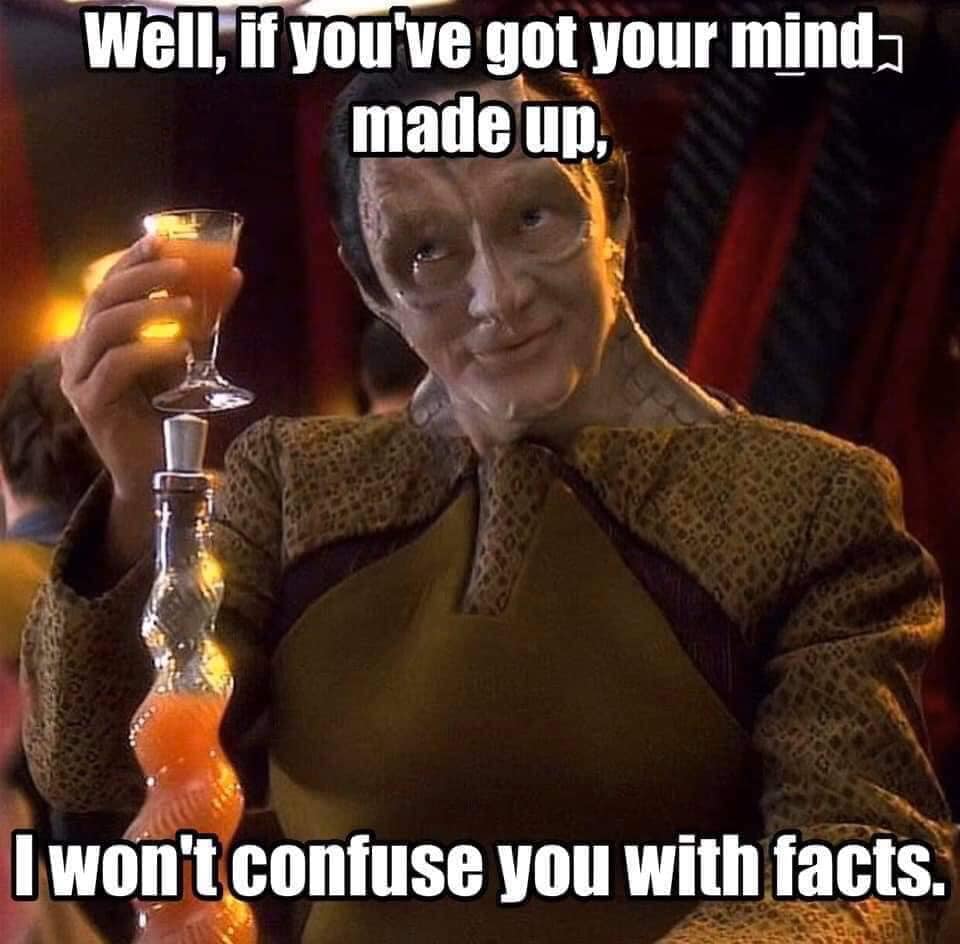
Before I found out that Encana/Ovintiv had broken all laws and regulations in place in Alberta to protect groundwater, the company completed two fraudulent noise studies in response to my noise complaints and many others in the community. The company violated my legal right to quiet enjoyment of my home and land for years with the regulator refusing to “regulate” anyone but me. Since passing off the noisy compressors and frac’d aquifers to Lynx, my legal right to quiet enjoyment of my home and land continues to be violated.
Living frac’d is horrendous hell. Never mind living with toxic chemicals and in explosive risk from dangerous levels of Encana/Ovintiv’s frac’d methane venting out of your water taps and painfully burning your skin while bathing or doing dishes or cleaning house, and the incessant roar of dangerous speeding frac traffic, slamming jake brakes, drilling, frac’ing and more, Encana’s unmitigated compressor noise stressed me and my dogs no end. Nights were the worst, especially in fall, winter and spring; my sleep was severely compromised and the dogs paced up and down the hall all night, every night.
For the first fraudulent noise study, Encana/Ovintiv put the microphone about 1,000 metres east of my home near the community hall and highway (to state it’s naturally noisy). The regulator’s noise directive mandates that it must be 15 metres from the complainant’s home. The company also turned off their noisiest compressor to conclude they were compliant and oh so quiet. EUB ate the company’s garbage hook line and sinker. I detailed Encana’s fraud and violations and sent it to the “regulator.”
For the second noise study, Encana violated even more rules, and my privacy rights (handed out an aerial map showing where I live at a large public meeting, but not showing where anyone else with noise complaints lived), yet the data still proved Encana’s noise was non-compliant so the “regulator” fraudulently altered Encana’s loud noise levels to make them quiet and compliant. I also pointed this out in writing to the EUB.
Then, the regulator deregulated their noise control directive to make Encana’s non compliances compliant. I pointed this out to the EUB too.
Then, to add more injury and insults, the EUB promised me a third study to make things right. They promised that Encana would not be told about this study so that no hanky panky could take place. I caught the EUB notifying Encana about the third study three times, so I told the regulator “no thank you” and why. There’s only so much fraud and stress a frac’d girl can take while living poisoned in her home from frac fumes and debilitating noise.
It is with an utter lack of surprise that I yet again fill the virtual pages of Double Aspect with thoughts on another of Justice Abella’s comments on the nature of judging. Both Leonid and I have continuously written about how Justice Abella frequently displays a judicial arrogance that is inconsistent with the role of a judge in a constitutional democracy, both descriptively and normatively. I hesitate to write yet again on the same subject.
But I am moved to do so by the utter lack of accuracy in Justice Abella’s recent speech at Fordham University, where she described a bastardized version of the Canadian approach to constitutional and statutory interpretation. …
.. While I believe that Justice Abella means well, she reveals an unfortunate arrogance that crops up in speech after speech. For one, she claims the law is her opinion when it is not. Then, she takes on the mantle of judging what a statute should mean, given her own impressions of what it requires. It takes someone with much self-confidence to do this. Whether or not we should have confidence in her is quite another matter altogether. A Supreme Court judgeship is not enough, in a democracy, to give its holder the mantle of deciding what laws should mean or which laws should apply. Someone who believes so is better suited to be a politician than a judge.
Delusions of Grandeur, Justice Abella sets out a vision of the Supreme Court as arbiter of national values
I didn’t realize that writing op-eds for the media was part of the judicial job description, but apparently it is. There was of course Brett Kavanaugh’s instantly-notorious op-ed in the Wall Street Journal. And, ten days ago, Justice Abella followed in now-Justice Kavanaugh’s footsteps, with an op-ed of her own, in the Globe and Mail. The op-ed is an adaptation from a speech given on the occasion of the 70th anniversary of the Supreme Court of Israel; but Justice Abella, presumably, thinks that it deserves a Canadian audience as well as an Israeli one.
Why that ought to be the case, I am not quite sure. Part of the op-ed is meaningless twaddle: we have, Justice Abella tells us, a “national justice context” that is “democratically vibrant and principled”. Part is rank hypocrisy: the Supreme Court’s “only mandate is to protect the rule of law”, says the person who has devoted many a talk to criticizing the very idea of the Rule of Law and arguing that it had to be replaced by something called the rule of justice. Part is rotten grammar: “human rights is [sic] essential to the health of the whole political spectrum” (emphasis removed). But all of it is a self-assured presentation of a role for the judiciary that has nothing to do with the Rule of Law, and this bears commenting on. …
And while she begins by seemingly conceding that “[t]he Charter both represented and created shared and unifying national values”, Justice Abella then argues that it is the Supreme Court that has developed “a robust new justice consensus for Canada”. It is the Supreme Court that serves as “the final adjudicator of which contested values in a society should triumph”. (Wait… didn’t the Charter already represent and create shared values? How come these values are, after all, contested?) Fortunately, says Justice Abella, the Canadian public and its elected representatives have fallen into line and followed the Supreme Court’s moral leadership: “[c]riticisms and questions were of course raised, but usually with civility.” If Canada is committed to “pluralism and diversity”, rather than “obliteration of the identities that define us”, that’s because “[a]ll this came from the Supreme Court”, and its teachings were accepted by both “the public” and “the legislatures”.
Hence the empowerment of the Supreme Court, coupled with its independence, is all to the good. “[D]emocracy, Justice Abella insists, “is strengthened in direct proportion to the strength of rights protection and an independent judiciary”. Indeed, the very “humanity” of a country would be imperiled by attacks on judicial power. Hence Justice Abella’s plea in defence of the Supreme Court of Israel, delivered, she says, in her capacity not only “as a judge”, but also “as a citizen of the world”. (I assume Justice Abella has not been shy about criticizing the feebleness of the judiciary in countries like Russia and China, too, though I don’t think she has published op-eds about them. Perhaps she has even criticized the backward ways of the United Kingdom, Australia, and New Zealand, which haven’t seen it fit to remit the adjudication of contested values in their societies to the courts, though I can recall no op-eds on that subject either.)
….if the Supreme Court is to be the arbiter of national values, it is not at all clear why it should be staffed by judges—that is to say, by former lawyers, who are not trained for or especially good at this task. Why not economists and philosophers instead? …
And if the courts are not, after all, to be replaced by philosophical-economic colloquia, that’s probably because what we really want is for judges to stick to law. …
This brings me to Justice Abella’s most remarkable claim—that it is indeed the Supreme Court that defines not just our constitutional rights, but Canadian values more generally. … Justice Abella’s ambition is not so limited; she is not content to decide what our supreme law means; she wants to be the ultimate authority on what Canadians believe in. ![]() To force all Canadians to be pro Israel, no matter how horridly Palestians are murdered, human rights violated and lands stolen?
To force all Canadians to be pro Israel, no matter how horridly Palestians are murdered, human rights violated and lands stolen?![]() This is shocking stuff. In a free society, there can be no such authority, whether in the Supreme Court or elsewhere. In a free society, one cannot point to the constitution and say, Thatcher-style, “this is what we believe”. Citizens in a free society disagree, including about fundamental values. A constitution is only a judgment, albeit one reached by a super-majority—not, mind you, an actual consensus—about which of these values will be translated into legal constraints that will be imposed on the government until the constitution is amended. The courts’ job is to interpret these legal constraints, as they interpret other law; it is not to dictate “which contested values in a society should triumph”.
This is shocking stuff. In a free society, there can be no such authority, whether in the Supreme Court or elsewhere. In a free society, one cannot point to the constitution and say, Thatcher-style, “this is what we believe”. Citizens in a free society disagree, including about fundamental values. A constitution is only a judgment, albeit one reached by a super-majority—not, mind you, an actual consensus—about which of these values will be translated into legal constraints that will be imposed on the government until the constitution is amended. The courts’ job is to interpret these legal constraints, as they interpret other law; it is not to dictate “which contested values in a society should triumph”.
Justice Abella thinks that she is some sort of great and wise philosopher, and as such is qualified to dispense advice, both judicially and extra-judicially, on how people should organize their affairs and even what they should believe in. Her ladyship is labouring under a sad misapprehension in this regard. She is no great thinker. She has no answer to obvious questions that her arguments raise, and no justification for her extravagant assertions of authority. It is unfortunate that a person so utterly misguided holds an office with as much power and prestige as that of a Supreme Court judge. Still, as important as this office is, it is less significant than Justice Abella imagines. We remain free to reject the values the Supreme Court would have us subscribe to. When these values amount to uncritical polite deference to philosopher-kings in ermine-collared robes, we have very good reason to do so.
I sent my letter to my then lawyers, Murray Klippenstein and Cory Wanless, asking to cc them. They told me they thought my letter was great but did not want me to copy them to protect their careers/futures. I see now, since my ex lawyers pissed on the rules of their profession, quit, lied to me, left me hanging in unbearable stress for 2.5 years, still refuse to send me my property that I paid one Hell of a lot of money for, with Mr. Klippenstein even going so far as to misrepresent me to the court, that my career and future means nothing. Where’s the regulator? Oh ya, it’s frac’d. Canadian lawyers regulate themselves, just like our judges do.
Dear J Abella,
All the best to you in your retirement. May you and yours always have safe water to live with, bathe in and drink, and never have your skin and eyes painfully burned by it.
And, may you learn how to admit wrong doing and make amends.
Sincerely,
Jessica
***
“The Constitution of Canada is the supreme law of Canada“
The Supreme Court of Canada pissed on our “supreme law” in their 2017 ruling in Ernst vs AER.
To keep the oil, gas and frac industry, and freedom of expression destroying Israel happy?
